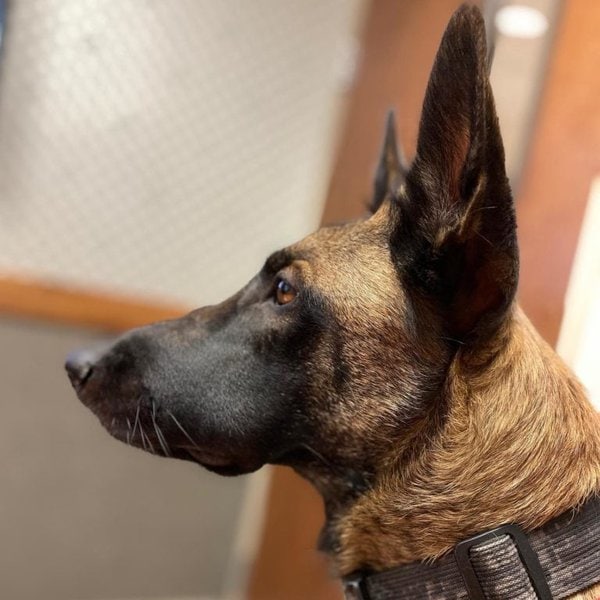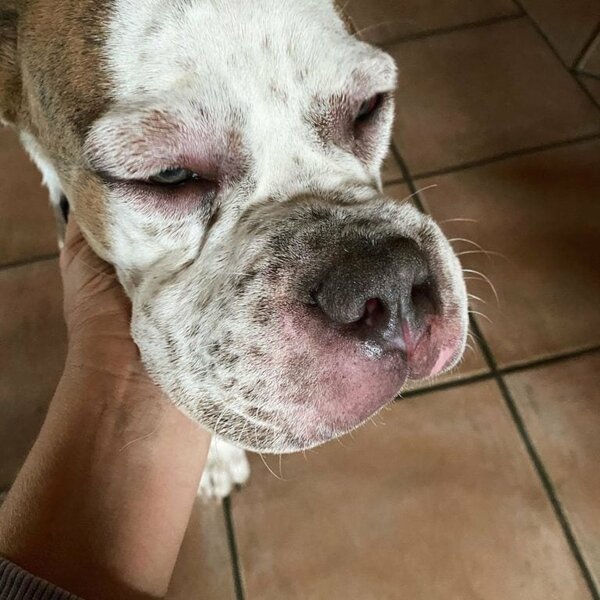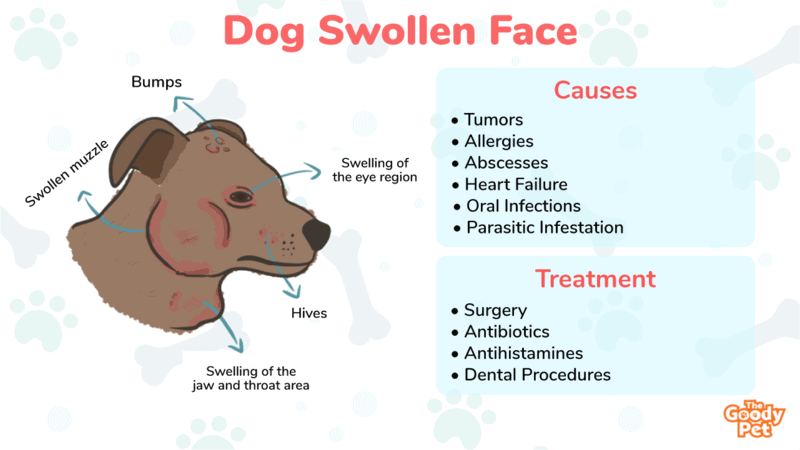Dogs’ faces swell for a variety of reasons, and knowledge as to why your pooch’s face is swollen is important to preserve its quality of life. Consequently, this is why we’ve put together this article on the common causes of facial swelling in dogs.
Now, what are the reasons a dog’s face may swell? Facial swelling in dogs may happen due to an allergic reaction in the pooch or as a result of a parasitic infection. A broken tooth may also cause a pooch’s face to swell and the presence of facial tumors have been linked to inflammation of a canine’s face.
While swelling of the face may not be immediately life-threatening for a pooch, it may also be an indicator of a more serious health condition, and a sign that you should pay close attention to your canine’s health. This article also contains info on the effective treatment methods for canine facial inflammation. But first, let’s take a more detailed look at factors that may cause a dog’s face to swell.
Why Would A Dog’s Face Swell?
Common causes of facial swelling in dogs include allergies, abscesses, dental and oral infections, tumors, parasitic infestation and congestive heart failure.
Allergies
Dogs react adversely to a variety of substances, and one of the signs that a pooch has come in contact with a substance that its body doesn’t react well with, is swelling of the face.
That said, some of the substances that are commonly responsible for triggering allergic reactions in dogs include food, chemicals, medication, insect bites or plant materials like pollen.
In some cases, swelling of a dog’s face, along with discoloration of the gums and fainting can be an indicator that the pooch is suffering from a severe allergic reaction that’s causing a blockage in the canine’s windpipe; This, in turn, results in breathing difficulties, and immediate medical attention is needed to keep such a pooch alive and healthy.
Abscesses
Dog abscesses are characterized by the collection of pus within a swollen region on the pooch’s face. And if you observe a loss of appetite in your pooch, coupled with characteristic face swelling, then such a dog is most likely suffering from an abscess of the head or neck.
Abscesses in dogs develop due to several reasons, but some of the most common causes include bites from insects or other animals, trauma from an injury or bacteria attacks.
Dental And Oral Infections
Dogs are prone to developing several dental and oral infections, and these tend to cause the infected pooch’s face to swell. A broken or fractured tooth, tooth root abscesses and gum diseases are some of the common dental problems that most dogs are predisposed to.
And along with the swelling of the face, dental infections are also very painful for dogs, and they usually cause high fever, loss of appetite, and subsequent weight loss.
Similarly, the swelling of a dog’s salivary glands can also trigger a corresponding swelling in the dog’s face.
Tumors
Tumors can develop anywhere on a dog’s body, but they all have one thing in common – they cause swelling; Hence, the swelling of a dog’s face may also mean that a tumor is growing on such a pooch’s face.
There are several reasons for growth of tumors on dogs, but some of the most common include cancer, hormonal imbalances, exposure to chemicals, and in some cases, genetics.
Parasitic Infestation
Dogs are susceptible to several parasites, and a swollen face may be telling you that a pooch is under attack from either tapeworms, hookworms, roundworms or whipworms.
The aforementioned parasites typically attack a dog’s intestines, but the presence of external parasites such as fleas, ticks and lice can also induce swelling of a pooch’s face.
Congestive Heart Failure
The facial swelling of a dog can also be an indicator of a highly serious health condition such as congestive heart failure.
Dogs suffering from a congestive heart failure typically experience inappropriate and excessive fluid build-up in the tissues surrounding the heart; The excess fluid, in turn, infiltrates surrounding tissues, and eventually makes its way up to the dog’s face, where it causes swelling.
How Does A Dog With A Swollen Face Look?
The first and immediately noticeable sign that a dog’s face is swollen is a distortion of the doggie’s facial shape. And along with this distortion, you will also notice signs such as:
- Swelling of the eye region – this may lead to the pooch not being able to close its eyes well
- A swollen muzzle
- Swelling of the jaw and throat area
- Bumps or hives on the dog’s face
A dog with a swollen face may also be itchy, depending on what is responsible for the swelling.

What Can I Give My Dog For A Swollen Face?
Treatment methods for a swollen face in a dog include the use of antihistamines, antibiotics, a dental procedure or surgery.
Immediately you notice facial swelling in a dog, the first point of action is to call your vet and book a medical appointment.
Facial swelling can be a sign that a dog has ingested something toxic which can be fatal, if prompt medical attention isn’t provided.
Once you’re at the clinic, the vet will try to determine the cause of the facial swelling by running a series of tests and physical examinations. Treatment for the swelling of a dog’s face is greatly influenced by the outcome of these tests. But some of the methods commonly prescribed by vets to treat face swelling in dogs include:
Antihistamines
Antihistamines are popular for their anti-inflammatory properties. And your vet may prescribe antihistamines, such as the popular Benadryl, to treat a swollen face in a dog suffering from a mild to moderate allergic reaction.
Antibiotics
Your vet may also prescribe the use of antibiotics to treat any penetrating injuries that may be responsible for inflammation of a dog’s face.
Surgery
Serious and life-threatening injuries responsible for facial swelling may need to be treated on the surgical table. Additionally, pooches suffering from cancer may require surgery and chemotherapy to get rid of the cancerous growth.
Dental Procedures
Similarly, your vet may refer you to a suitably qualified professional to tackle facial swelling induced by any of various dental and oral diseases. And treatment for a pooch’s dental condition typically ranges from surgery to remove the affected teeth to a simple dental cleaning exercise.
Home Remedies To Treat Your Dog’s Swollen Face?
There is little you can do to treat your dog’s swollen face at home, particularly if the swelling is caused by an underlying medical condition.
Also, because the pooch’s face is a sensitive region, one needs to be careful with applying any of the home remedies that would normally work so well on other regions of the dog’s body.
Massage The Dog’s Swollen Face
It’s not all doom and gloom though, and you can relieve an abscess on your dog at home by massaging the affected region with the warm, wet compresses. This method works best for mild cases of swelling, and should be repeated several times a day till the swelling is reduced.

How To Prevent Your Dog’s Face From Swelling?
You can avoid facial swelling in your dog by minimizing the pooch’s contact with allergens, carrying out routine medical checks, maintaining great oral hygiene and supervising your dog’s play.
Keep Your Dog Away From Allergens
One way of preventing allergic reactions, and subsequent face swelling in your dog, is by minimizing the pooch’s contact with allergic triggers.
And while it may be difficult to keep a dog away from allergens, no thanks to the sheer volume of substances that can trigger reactions in pooches, it can help to start by subjecting your pooch to tests based around the most common dog allergies.
Routine Medical Checks
By subjecting your pooch to regular and routine medical check-ups, you can catch the development of diseases in a relatively early stage. And by taking the appropriate measures, you can ensure that such diseases don’t degenerate into the growth of abscesses on your dog’s face or other potentially life-threatening conditions.
Maintaining Great Oral Hygiene
By taking good care of your dog’s teeth and mouth, you can prevent the occurrence of the various dental challenges that may cause the pooch’s face to swell.
Make sure you regularly brush your canine’s teeth, and occasionally inspect the pooch’s mouth for signs of an oral infection. You can also look into dental water additives to help improve your dog’s dental health.
Supervising Your Dog’s Play
Medical check-ups are useless in preventing injuries and trauma, but it can help to keep a close eye on your pooch while it’s playing to keep it from coming in contact with potentially harmful substances.
Monitor interactions between your dog and other animals, and break off such interactions immediately you notice signs of hostility that may degenerate into a fight.






